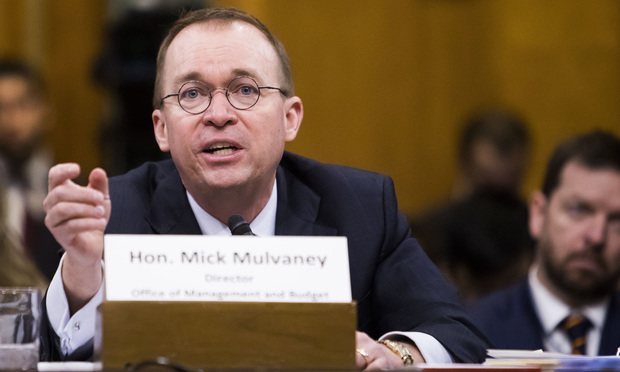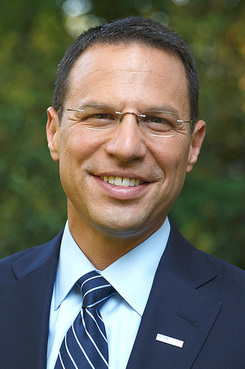Mick Mulvaney Tells State AGs the CFPB Won't 'Get in Your Way'
"If we think it's a good case, we'll bring it. If not, we're happy to get out of the way and let you all do it by yourselves," Mick Mulvaney, the acting Consumer Financial Protection Bureau director, told state attorneys general Wednesday in Washington.
February 28, 2018 at 05:00 PM
4 minute read
 Mick Mulvaney, Director of the Office of Management and Budget (OMB), testifies before the Senate Budget Committee on February 13, 2018. Credit: Diego M. Radzinschi/ ALM
Mick Mulvaney, Director of the Office of Management and Budget (OMB), testifies before the Senate Budget Committee on February 13, 2018. Credit: Diego M. Radzinschi/ ALM Since taking over the Consumer Financial Protection Bureau last year, White House budget director Mick Mulvaney has not hidden his dissatisfaction with the agency's enforcement record.
Mulvaney declared an end to the days of “pushing the envelope.” He signaled, in a strategic plan released this month, that the agency would make lighter use of perhaps the most powerful weapon in its enforcement arsenal: the authority to police “unfair, deceptive or abusive acts or practices.” In industry jargon, that's “UDAAP” for short.
But there is only so much Mulvaney, or any leader of the CFPB, can do to pull back on those enforcement efforts. The Dodd-Frank Act, which created the CFPB, also handed state attorneys general the power to claim violations of that federal law's prohibition on unfair and deceptive practices.
That authority has become particularly meaningful at a time when state attorneys general are taking steps to pick up any slack left by federal regulators under the Trump administration. On Wednesday, with Mulvaney appearing at the winter meeting of the National Association of Attorneys General, Pennsylvania Attorney General Josh Shapiro pressed for the CFPB to not interfere with any states' efforts to bring claims under Dodd-Frank.
 Josh Shapiro
Josh Shapiro“I think it's important we continue to have that latitude to bring the cases that we think are important,” Shapiro said.
States are required to consult with the CFPB before bringing an enforcement action under Dodd-Frank, and the bureau is allowed to intervene. When asked about his philosophy toward states exerting their Dodd-Frank authority, Mulvaney appeared to endorse a hands-off approach, saying “we are not there to get in your way.”
“My interest has been whether or not we are going to spend our efforts on what I consider to be solid legal claims,” Mulvaney said. “I've been a little bit surprised at how hard we have pushed the envelope in a couple of circumstances. So I'm much more interested not in who's bringing the case but the merits of the case that we're bringing. If we think it's a good case, we'll bring it. If not, we're happy to get out of the way and let you all do it by yourselves.”
Shapiro's office in Pennsylvania has stepped up its attention to the financial industry since Trump took office. Last year, Shapiro launched a consumer financial protection unit that, he said, would “focus on lenders that prey on seniors, families with students, and military service members, including for-profit colleges and mortgage and student loan servicers.”
He chose a veteran of the CFPB, Nicholas Smyth, to lead the new unit. Smyth joined Shapiro's office from Reed Smith's Pittsburgh office.
State attorneys general in Connecticut, Florida, Illinois and Mississippi all filed lawsuits in 2014 using their Dodd-Frank authority.
In August 2017, Massachusetts Attorney General Maura Healey included a Dodd-Frank claim in her office's lawsuit against the Pennsylvania Higher Education Assistance Association, one of the largest servicers of student loans in the United States. The lawsuit, which is pending in Suffolk Superior Court, alleges PHEAA mismanaged federal loan forgiveness programs, sometimes by overcharging borrowers and preventing them from staying on track with repayment programs.
“Attorneys general, a core group of them, are interested in making sure they are in a position to bring enforcement actions and pursue investigations in the consumer financial services area,” said Venable partner Allyson Baker, a former CFPB enforcement attorney. “And there's no doubt there's a huge uptick in that space.”
This content has been archived. It is available through our partners, LexisNexis® and Bloomberg Law.
To view this content, please continue to their sites.
Not a Lexis Subscriber?
Subscribe Now
Not a Bloomberg Law Subscriber?
Subscribe Now
NOT FOR REPRINT
© 2025 ALM Global, LLC, All Rights Reserved. Request academic re-use from www.copyright.com. All other uses, submit a request to [email protected]. For more information visit Asset & Logo Licensing.
You Might Like
View All
'Something Else Is Coming': DOGE Established, but With Limited Scope

Supreme Court Considers Reviving Lawsuit Over Fatal Traffic Stop Shooting

US DOJ Threatens to Prosecute Local Officials Who Don't Aid Immigration Enforcement
3 minute read
US Judge Cannon Blocks DOJ From Releasing Final Report in Trump Documents Probe
3 minute readTrending Stories
Who Got The Work
J. Brugh Lower of Gibbons has entered an appearance for industrial equipment supplier Devco Corporation in a pending trademark infringement lawsuit. The suit, accusing the defendant of selling knock-off Graco products, was filed Dec. 18 in New Jersey District Court by Rivkin Radler on behalf of Graco Inc. and Graco Minnesota. The case, assigned to U.S. District Judge Zahid N. Quraishi, is 3:24-cv-11294, Graco Inc. et al v. Devco Corporation.
Who Got The Work
Rebecca Maller-Stein and Kent A. Yalowitz of Arnold & Porter Kaye Scholer have entered their appearances for Hanaco Venture Capital and its executives, Lior Prosor and David Frankel, in a pending securities lawsuit. The action, filed on Dec. 24 in New York Southern District Court by Zell, Aron & Co. on behalf of Goldeneye Advisors, accuses the defendants of negligently and fraudulently managing the plaintiff's $1 million investment. The case, assigned to U.S. District Judge Vernon S. Broderick, is 1:24-cv-09918, Goldeneye Advisors, LLC v. Hanaco Venture Capital, Ltd. et al.
Who Got The Work
Attorneys from A&O Shearman has stepped in as defense counsel for Toronto-Dominion Bank and other defendants in a pending securities class action. The suit, filed Dec. 11 in New York Southern District Court by Bleichmar Fonti & Auld, accuses the defendants of concealing the bank's 'pervasive' deficiencies in regards to its compliance with the Bank Secrecy Act and the quality of its anti-money laundering controls. The case, assigned to U.S. District Judge Arun Subramanian, is 1:24-cv-09445, Gonzalez v. The Toronto-Dominion Bank et al.
Who Got The Work
Crown Castle International, a Pennsylvania company providing shared communications infrastructure, has turned to Luke D. Wolf of Gordon Rees Scully Mansukhani to fend off a pending breach-of-contract lawsuit. The court action, filed Nov. 25 in Michigan Eastern District Court by Hooper Hathaway PC on behalf of The Town Residences LLC, accuses Crown Castle of failing to transfer approximately $30,000 in utility payments from T-Mobile in breach of a roof-top lease and assignment agreement. The case, assigned to U.S. District Judge Susan K. Declercq, is 2:24-cv-13131, The Town Residences LLC v. T-Mobile US, Inc. et al.
Who Got The Work
Wilfred P. Coronato and Daniel M. Schwartz of McCarter & English have stepped in as defense counsel to Electrolux Home Products Inc. in a pending product liability lawsuit. The court action, filed Nov. 26 in New York Eastern District Court by Poulos Lopiccolo PC and Nagel Rice LLP on behalf of David Stern, alleges that the defendant's refrigerators’ drawers and shelving repeatedly break and fall apart within months after purchase. The case, assigned to U.S. District Judge Joan M. Azrack, is 2:24-cv-08204, Stern v. Electrolux Home Products, Inc.
Featured Firms
Law Offices of Gary Martin Hays & Associates, P.C.
(470) 294-1674
Law Offices of Mark E. Salomone
(857) 444-6468
Smith & Hassler
(713) 739-1250










